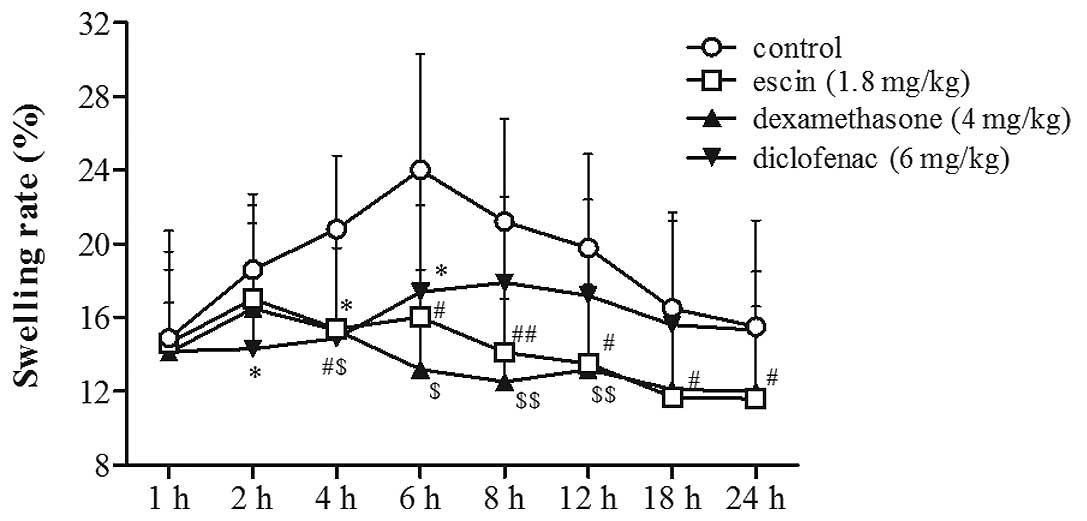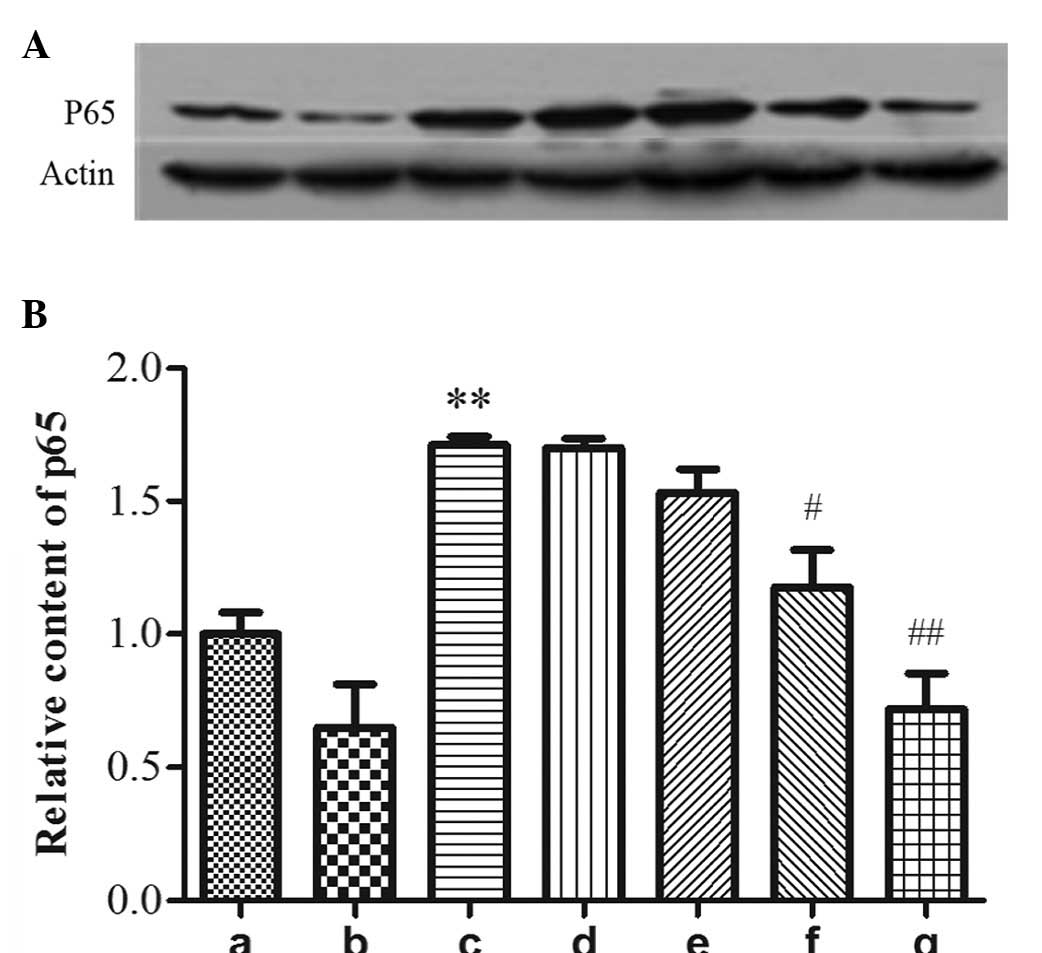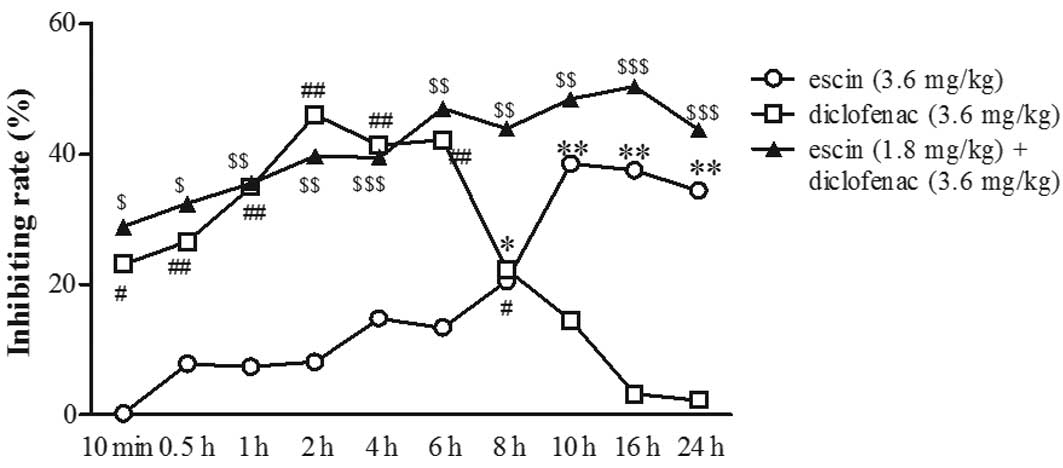|
1.
|
Fu F, Hou Y, Jiang W, Wang R and Liu K:
Escin: inhibiting inflammation and promoting gastrointestinal
transit to attenuate formation of postoperative adhesions. World J
Surg. 29:1614–1620. 2005. View Article : Google Scholar : PubMed/NCBI
|
|
2.
|
Zhang L, Fu F, Zhang X, Zhu M, Wang T and
Fan H: Escin attenuates cognitive deficits and hippocampal injury
after transient global cerebral ischemia in mice via regulating
certain inflammatory genes. Neurochem Int. 57:119–127. 2010.
View Article : Google Scholar
|
|
3.
|
Xin W, Zhang L, Fan H, Jiang N, Wang T and
Fu F: Escin attenuates acute lung injury induced by endotoxin in
mice. Eur J Pharm Sci. 42:73–80. 2011. View Article : Google Scholar : PubMed/NCBI
|
|
4.
|
Jiang N, Xin W, Wang T, Zhang L, Fan H, Du
Y, Li C and Fu F: Protective effect of aescin from the seeds of
Aesculus hippocastanum on liver injury induced by endotoxin
in mice. Phytomedicine. 18:1276–1284. 2011. View Article : Google Scholar : PubMed/NCBI
|
|
5.
|
Zhang L, Wang H, Fan H, Wang T, Jiang N,
Yu P and Fu F: The potent anti-inflammatory agent escin does not
increase corticosterone secretion and immune cell apoptosis in
mice. Fitoterapia. 82:861–867. 2011. View Article : Google Scholar : PubMed/NCBI
|
|
6.
|
Rhen T and Cidlowski JA: Antiinflammatory
action of glucocorticoids - new mechanisms for old drugs. N Engl J
Med. 353:1711–1723. 2005. View Article : Google Scholar : PubMed/NCBI
|
|
7.
|
Wang YW, Wang SJ, Zhou YN, Pan SH and Sun
B: Escin augments the efficacy of gemcitabine through
down-regulation of nuclear factor-κB and nuclear
factor-κB-regulated gene products in pancreatic cancer both in
vitro and in vivo. J Cancer Res Clin Oncol. 138:785–797.
2012.PubMed/NCBI
|
|
8.
|
Harikumar KB, Sung B, Pandey MK, Guha S,
Krishnan S and Aggarwal BB: Escin, a pentacyclic triterpene,
chemosensitizes human tumor cells through inhibition of nuclear
factor-kappaB signaling pathway. Mol Pharmacol. 77:818–827. 2010.
View Article : Google Scholar
|
|
9.
|
Williams PB and Joyner JH: Response of
peripheral collateral arteries in the dog to prostaglandins E1, E2,
F2 alpha, and I2 (prostacyclin). J Cardiovasc Pharmacol. 4:784–790.
1982. View Article : Google Scholar : PubMed/NCBI
|
|
10.
|
Emerson TE Jr, Jelks GW, Daugherty RM Jr
and Hodgman RE: Effects of prostaglandin E1 and F2 alpha on venous
return and other parameters in the dog. Am J Physiol. 220:243–249.
1971.PubMed/NCBI
|
|
11.
|
Uski TK, Andersson KE, Brandt L and
Ljunggren B: Characterization of the prostanoid receptors and of
the contractile effects of prostaglandin F2 alpha in human pial
arteries. Acta Physiol Scand. 121:369–378. 1984. View Article : Google Scholar : PubMed/NCBI
|
|
12.
|
Amann-Vesti BR, Gitzelmann G,
Koppensteiner R and Franzeck UK: Isoprostane 8-epi-prostaglandin F2
alpha decreases lymph capillary pressure in patients with primary
lymphedema. J Vasc Res. 40:77–82. 2003. View Article : Google Scholar : PubMed/NCBI
|
|
13.
|
Sinzinger H, Oguogho A and Kaliman J:
Isoprostane 8-epi-prostaglandin F2 alpha is a potent contractor of
human peripheral lymphatics. Lymphology. 30:155–159.
1997.PubMed/NCBI
|
|
14.
|
Longiave D, Omini C, Nicosia S and Berti
F: The mode of action of aescin on isolated veins: relationship
with PGF2 alpha. Pharmacol Res Commun. 10:145–152. 1978. View Article : Google Scholar : PubMed/NCBI
|
|
15.
|
Berti F, Omini C and Longiave D: The mode
of action of aescin and the release of prostaglandins.
Prostaglandins. 14:241–249. 1977. View Article : Google Scholar : PubMed/NCBI
|
|
16.
|
Carrasco OF and Vidrio H: Endothelium
protectant and contractile effects of the antivaricose principle
escin in rat aorta. Vascul Pharmacol. 47:68–73. 2007. View Article : Google Scholar : PubMed/NCBI
|
|
17.
|
Lu NZ, Wardell SE, Burnstein KL, Defranco
D, Fuller PJ, Giguere V, Hochberg RB, McKay L, Renoir JM, Weigel
NL, et al: International Union of Pharmacology. LXV. The
pharmacology and classification of the nuclear receptor
superfamily: glucocorticoid, mineralocorticoid, progesterone, and
androgen receptors. Pharmacol Rev. 58:782–797. 2006. View Article : Google Scholar
|
|
18.
|
Mckay LI and Cidlowski JA: Molecular
control of immune/inflammatory responses: interactions between
nuclear factor-kappa B and steroid receptor-signaling pathways.
Endocrine Rev. 20:435–459. 1999.
|
|
19.
|
Ku EC, Wasvary JM and Cash WD: Diclofenac
sodium (GP 45840, Voltaren), a potent inhibitor of prostaglandin
synthetase. Biochem Pharmacol. 24:641–643. 1975. View Article : Google Scholar : PubMed/NCBI
|
|
20.
|
Ku EC, Kothari H, Lee W, Kimble EF and
Liauw LH: Effects of diclofenac sodium on arachidonic acid
metabolism. Agents Actions Suppl. 17:189–193. 1985.PubMed/NCBI
|

















